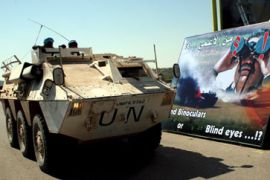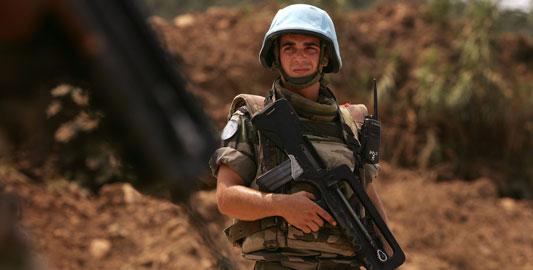Policing peace in southern Lebanon
Al Jazeera examines whether an increased UN peacekeeping force is having an impact.

 |
| The United Nations had difficulty getting countries to commit soldiers to the strengthened Unifil force [GALLO/GETTY] |
So, is the United Nations holding the line in southern Lebanon a year after Israeli forces streamed across the frontier and left Unifil (United Nations International Forces In Lebanon) stranded in their encampments?
In so far as there has not been a resurgence of conflict the answer, to an extent, is a qualified ‘yes’.
The United Nations is good at holding and securing the peace, especially when the protagonists have been obliged to put distance between one another, witness the Golan Heights and Cyprus.
These two former theatres of conflict have been patrolled by the UN since the early 1970s, without a rocket being fired by either side.
Southern Lebanon is a different matter, and Unifil’s limited terms of engagement alongside it’s equally limited manpower, meant that the UN became an irrelevance as soon as Israeli tanks crossed the border last summer.
UN influence
And yet the United Nations did recover and came to play a major role in brokering a deal in the aftermath of the Israeli invasion.
|
|
The organisation carried influence, largely because the country with the most influence over Israel, the United States, chose not to use any of it to halt the war in southern Lebanon. That job fell squarely to the United Nations.
It is charged with effectively demilitarising an area south of the Litani river that had become controlled by Hezbollah fighters.
The UN’s critics say that this is what is was supposed to be doing before last year’s conflict.
It also has a mandate to halt the flow of weapons to Hezbollah, while at the same time doing its best to control incursions, particularly air incursions, by the Israelis.
The peacekeepers’ job is difficult at the best of times and it was not made any easier by the fact that some of those countries, notably France, who argued most strongly for a new and stronger force in Lebanon, initially were not prepared to supply the troops.
Shebaa farms
Ban Ki-moon, the UN secretary general, has spent a great deal of time and energy, not only trying to stop conflict breaking out again, but also helping to resolve the outstanding contested Shebaa Farms issues.
This scrap of contested land, captured by Israel when it moved into the Golan Heights after the 1967 war, has been invaluable propaganda material for Hezbollah, and the UN is keen to see this perennial irritant resolved.
Israel sees the Shebaa farms as part of the annexed Golan Heights but Hezbollah cites the continued Israeli presence in the area as justification for continued attacks.
The world was deeply shocked by the scenes of violence and destruction that emanated from southern Lebanon last year.
But the relative lack of success of Israel’s well-equipped conventional army against a rag-tag army of guerrilla fighters in the shape of Hezbollah, has sent shockwaves across the region.
To an extent, there is an air of ‘unfinished business’ hanging over southern Lebanon.
The UN’s forces may now be larger and have a better defined role, but if conflict were to break out once again, it is difficult to see how they could handle it much differently than the last time.